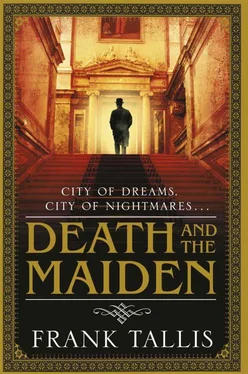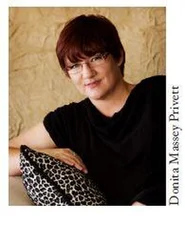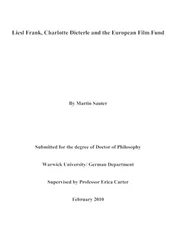Frank Tallis - Death And The Maiden
Здесь есть возможность читать онлайн «Frank Tallis - Death And The Maiden» весь текст электронной книги совершенно бесплатно (целиком полную версию без сокращений). В некоторых случаях можно слушать аудио, скачать через торрент в формате fb2 и присутствует краткое содержание. Жанр: Исторический детектив, на английском языке. Описание произведения, (предисловие) а так же отзывы посетителей доступны на портале библиотеки ЛибКат.
- Название:Death And The Maiden
- Автор:
- Жанр:
- Год:неизвестен
- ISBN:нет данных
- Рейтинг книги:5 / 5. Голосов: 1
-
Избранное:Добавить в избранное
- Отзывы:
-
Ваша оценка:
- 100
- 1
- 2
- 3
- 4
- 5
Death And The Maiden: краткое содержание, описание и аннотация
Предлагаем к чтению аннотацию, описание, краткое содержание или предисловие (зависит от того, что написал сам автор книги «Death And The Maiden»). Если вы не нашли необходимую информацию о книге — напишите в комментариях, мы постараемся отыскать её.
Death And The Maiden — читать онлайн бесплатно полную книгу (весь текст) целиком
Ниже представлен текст книги, разбитый по страницам. Система сохранения места последней прочитанной страницы, позволяет с удобством читать онлайн бесплатно книгу «Death And The Maiden», без необходимости каждый раз заново искать на чём Вы остановились. Поставьте закладку, и сможете в любой момент перейти на страницу, на которой закончили чтение.
Интервал:
Закладка:
‘Love did not make her happy. This was not necessarily the fault of the gentlemen. She could have made different choices.’
‘Forgive me, Herr Schneider,’ said Rheinhardt, ‘but I am finding it rather difficult to understand your meaning. Would you be kind enough to speak more directly?’
Schneider nodded, and lit another cigarette before resuming. ‘What I mean to say is, Fraulein Rosenkrantz was in the habit of becoming romantically attached to unsuitable men, more often than not older men … like Winkelmann.’
‘Hermann Winkelmann?’ asked Rheinhardt.
Schneider did not respond to the question and just carried on. ‘It was plain to me that such relationships would never amount to much. The gentlemen were usually married with families. They were never very serious about her. She, however, was always serious about them . She would have found happiness more readily in the arms of someone like Schmedes, or a young officer, someone looking for romance rather than a brief amorous adventure.’
‘Was she rejected then, in the spring? asked Liebermann.
Schneider turned towards Rheinhardt. ‘This is rather difficult for me, inspector. I feel as though I am betraying her.’
‘It is extremely important,’ Rheinhardt replied, ‘that we determine Fraulein Rosenkrantz’s state of mind at the time of her death. If you know anything at all that clarifies the issue, then you must say.’
Schneider shrugged. ‘I suppose whatever I disclose now cannot harm her.’ He sucked on his cigarette and blew the smoke out through his nostrils. ‘She got herself pregnant … and sought assistance to resolve the predicament.’
‘The pregnancy was terminated?’ asked Liebermann.
‘Yes.’
‘Who was the father?’ asked Rheinhardt.
‘She never told me. But from that time onwards, as far as I’m concerned, she was never herself again. She became sad, preoccupied. She had some kind of throat problem, which got worse. Fortunately, it only became very bad when the opera house closed for the summer. I think she started seeing the psychiatrist about then, too. One must suppose he helped her a little, because she was ready to sing again before the new season started. Be that as it may, she wasn’t the same person. I don’t know how to describe it.’
‘When did she tell you about the termination of her pregnancy?’ asked Rheinhardt.
‘About three weeks ago, after a performance of Fidelio . She burst into the dressing room and started crying as soon as she was through the door. She was beside herself and said all kinds of things about how she was going to hell, and that it was only right given the severity of her sin. I had to give her some slivovitz to bring her back to her senses and then I had to cancel her table at the Imperial.’ Schneider flicked a smut of ash from his trousers. ‘It was going to be impossible to get her out of the building without being seen and I was worried about what might happen if we encountered anyone important as we tried to leave. But I needn’t have worried. She acted her way out. No one would have suspected that only minutes earlier she had been weeping uncontrollably, digging her fingernails into her own flesh … horrible.’ Schneider shuddered. ‘You would never have guessed it. She smiled, accepted compliments, and even stopped to sign a few autographs before getting into her carriage. Remarkable.’
‘Was she a religious person?’ Liebermann asked.
‘Did she go to church? No. But she believed in God and the life everlasting. And she was very superstitious. Although, to be superstitious signifies little in the theatre — all performers are superstitious — but I think it would be fair to say that she was more prone than most. She used to consult a psychic every month. Regular appointments.’
‘Do you know the psychic’s name?’ asked Rheinhardt. ‘Or where we could find her?’
‘Fraulein Rosenkrantz referred to the woman only as Orsola. I’m afraid I have no idea where she lives. Somewhere near the Prater, I imagine.’
‘Who do you think made her pregnant?’ asked Rheinhardt. ‘Did you suspect anyone? You said that she once had an affair with Winkelmann.’
‘Winkelmann was last year, and that particular liaison didn’t last very long. But as for the spring …’ Schneider stroked his chin as he cast his mind back. ‘I can remember her mentioning the names of several men with whom I thought there was some involvement . Count Wilczek and a wealthy banker, I think his name was Bader. But as to the extent of their intimacy, whether or not these gentlemen …’ Schneider was evidently embarrassed. ‘I really couldn’t say.’ His arms wheeled in the air. ‘She was always mentioning suitors. Besides, what does it matter? How does such information advance your investigation, inspector? Surely, knowing whether it was this man or that man who made Fraulein Rosenkrantz pregnant is of little consequence now?’
Rheinhardt nodded.
Outside, an organ-grinder began to play, a skipping folk melody that floated up above the sound of the busy traffic. The atmosphere in the room had become intense, and the music, rustic and simple, came as something of a relief. Its naivety was refreshing, like a gust of clean air dissipating the stench rising from a stagnant pool.
‘Fraulein Amsel,’ said Rheinhardt, bluntly. ‘What can you tell us about her?’
Schneider’s expression soured. ‘One must always respect the achievement of anyone appointed to sing at the court opera, but she is someone for whom I harbour very little esteem or affection.’
‘We have been told,’ said Rheinhardt, ‘that there was much bad feeling between Frauleins Amsel and Rosenkrantz.’
‘There was, indeed,’ Schneider replied. ‘But Fraulein Rosenkrantz was blameless, believe me. She did nothing wrong.’
Schneider recounted the history of Amsel and Rosenkrantz’s feud, beginning, as Director Mahler had, with Rosenkrantz’s eleventh-hour substitution as Senta in The Flying Dutchman . He tried to contain his bile, but in the end he was unable to maintain even a semblance of civility, and vented his true feelings in a colourful tirade.
‘She — Amsel — is puffed-up and arrogant — and how she overestimates her voice. In spite of her size, it lacks strength. You can hardly hear her over an orchestral tutti — it’s quite insufficient. Whereas Rosenkrantz …’ Again his hands conjured hoops in the air. ‘Even with the brass section playing fortissimo , and the timpani rolling like thunder, you could hear her, floating above — sublime — angelic — clear as a bell.’ Schneider’s mouth twisted. ‘Amsel despised Ida. She could not accept that she had been bettered and in the very role which had made her famous. She was eaten up with jealousy, and she couldn’t disguise it. You saw it on her face.’ Schneider drew on his cigarette, expelling the smoke as he continued to speak. ‘I remember … shortly after Ida’s triumph in The Flying Dutchman she was invited to sing for the mayor at his birthday celebrations. A few days later we were in the Imperial, and who should come in but Lueger himself with his entire entourage. They were all in their uniforms and wearing white carnations. The mayor caught sight of Ida and, brushing the head waiter aside, came straight to our table. He kissed her hand and thanked her for agreeing to sing. A real gentleman — the mayor — so well-mannered. Amsel was seated at a table close by. My God! Her eyes. Let me tell you, if she had picked up her pastry fork and stabbed Ida in the back I would not have been surprised!’
13
As the tram came to a halt outside the town hall, Liebermann looked out of the window and saw a crowd of men standing on the pavement. There were red flags being waved and a banner, drooping between two poles, showed the masthead of a daily socialist newspaper, the Arbeiter Zeitung . On a makeshift platform made from wooden crates stood a speaker, angrily jabbing his finger at the seat of municipal power. Every jab was accompanied by a cheer from his supporters. Another group of men, all of whom were wearing white carnations, had gathered close by and were jeering. This second group were smartly dressed, but there was something about them that made Liebermann uneasy. They looked quite menacing.
Читать дальшеИнтервал:
Закладка:
Похожие книги на «Death And The Maiden»
Представляем Вашему вниманию похожие книги на «Death And The Maiden» списком для выбора. Мы отобрали схожую по названию и смыслу литературу в надежде предоставить читателям больше вариантов отыскать новые, интересные, ещё непрочитанные произведения.
Обсуждение, отзывы о книге «Death And The Maiden» и просто собственные мнения читателей. Оставьте ваши комментарии, напишите, что Вы думаете о произведении, его смысле или главных героях. Укажите что конкретно понравилось, а что нет, и почему Вы так считаете.












